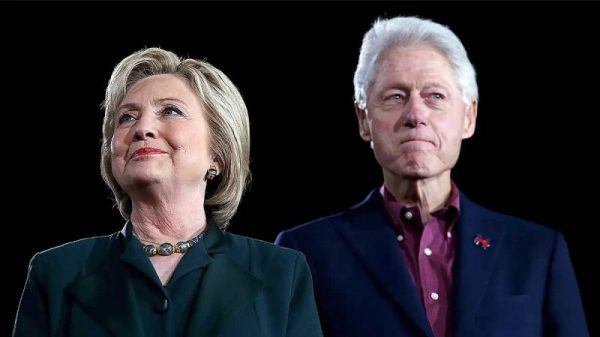When Sen. Tim Scott threatened to attack fellow South Carolinian former governor Nikki Haley on the debate stage Wednesday, she encouraged him.
“Bring it, Tim,” she declared.
Of the seven politicians vying for the Republican nomination at Wednesday’s debate, Haley appeared the most eager to clash with her competitors after proving herself a nimble debater in the first showdown. After the first debate, she managed to climb up some polls, though still trailing behind rival Donald Trump by double digits. Now, in the second debate, which took place in the Ronald Reagan Presidential Library in Simi Valley, Calif., Haley sought to make the case that she should be the party’s first-ever female nominee, not by mentioning her gender but seizing on opportunities to attack her male opponents.
Haley tangled with nearly all the other candidates on the stage, blasting Scott on government spending, hitting Florida Gov. Ron DeSantis’s record against fracking and bashing Vivek Ramaswamy’s flip-flop stance on TikTok.
Her skewering of Ramaswamy offered one of the most memorable lines of the evening.
“Honestly, every time I hear you I feel a little bit dumber,” she said.
While Haley notably held back on direct criticisms of Trump — the clear front-runner who wasn’t at the debate — her jabs at fellow rivals still caught the Trump campaign’s attention. Minutes before the debate ended, his campaign blasted out an email filled with opposition research against Haley titled “The Real Nikki Haley,” citing her previous praise of Hillary Clinton, her support of Ukraine and her opposition to a U.S.-Mexico border wall.
Haley, who served in the Trump administration as his U.N. ambassador, has ramped up her rhetoric against him in recent weeks since her commanding performance in the first debate. She vaulted to second place in early New Hampshire, according to a Saint Anselm poll, at 15 percent compared with Trump’s 45 percent, surpassing DeSantis’s 11 percent. A Fox Business poll last week showed support for Haley doubled in Iowa, boosting her to the top three.
It remains to be seen how well her blows in this debate registered with Republican primary voters, and in particular, women.
Some political experts told The Washington Post ahead of the debate that Republican primary voters are less interested in identity politics, and Haley’s mentions of her gender or ethnicity might not resonate with certain demographics.
Kelly Dittmar, director of research at the Center for American Women and Politics at Rutgers University, said that gender-focused politicking might make less of a dent in a GOP base that has lost a share of college-educated women in recent years.
“Those messages about gender and women empowerment probably resonate even less with the Republican base of today,” Dittmar said.
Jane Junn, a professor of political science and gender studies at the University of Southern California, agreed, saying that while Haley was clearly dominant in her debate performance, that might be a turnoff to some conservative voters.
“We don’t have a lot of examples among female Republican politicians,” Junn said, citing Reps. Marjorie Taylor Greene (Ga.) and Lauren Boebert (Colo.), “but they react badly to women they perceive to be aggressive, such as Clinton.”
While Haley refrained from discussing her gender in the second debate, she at one point emphasized it in the first.
“This is exactly why Margaret Thatcher said if you want something said ask a man, if you want something done ask a woman,” she said as the men onstage sparred. And she has talked about her lived experiences on the campaign trail in an attempt to relate to female voters.
Live-reaction dial data compiled by Navigator Research of independents watching the first debate revealed most viewers felt like Haley won the debate. They responded positively to her answers on climate change, education and foreign policy, with women’s positive views of Haley spiking as she called Russian President Vladimir Putin a “murderer.”
By the end of Wednesday’s debate, several Republicans praised Haley’s performance on X, formerly Twitter, while others panned her as too aggressive.
Former Fox News host Megyn Kelly said Haley “seems rude” in critiquing her opponents.
Republican strategist Matt Mackowiak declared that she was “consistently impressive.”
“I suspect a lot of Republican women watching that debate tonight were either silently thinking or perhaps even sort of cheering her on ‘go Nikki go,’” he told The Post. “It may be the secret weapon she has.”
When Sen. Tim Scott threatened to attack fellow South Carolinian former governor Nikki Haley on the debate stage Wednesday, she encouraged him.
“Bring it, Tim,” she declared.
Of the seven politicians vying for the Republican nomination at Wednesday’s debate, Haley appeared the most eager to clash with her competitors after proving herself a nimble debater in the first showdown. After the first debate, she managed to climb up some polls, though still trailing behind rival Donald Trump by double digits. Now, in the second debate, which took place in the Ronald Reagan Presidential Library in Simi Valley, Calif., Haley sought to make the case that she should be the party’s first-ever female nominee, not by mentioning her gender but seizing on opportunities to attack her male opponents.
Haley tangled with nearly all the other candidates on the stage, blasting Scott on government spending, hitting Florida Gov. Ron DeSantis’s record against fracking and bashing Vivek Ramaswamy’s flip-flop stance on TikTok.
Her skewering of Ramaswamy offered one of the most memorable lines of the evening.
“Honestly, every time I hear you I feel a little bit dumber,” she said.
While Haley notably held back on direct criticisms of Trump — the clear front-runner who wasn’t at the debate — her jabs at fellow rivals still caught the Trump campaign’s attention. Minutes before the debate ended, his campaign blasted out an email filled with opposition research against Haley titled “The Real Nikki Haley,” citing her previous praise of Hillary Clinton, her support of Ukraine and her opposition to a U.S.-Mexico border wall.
Haley, who served in the Trump administration as his U.N. ambassador, has ramped up her rhetoric against him in recent weeks since her commanding performance in the first debate. She vaulted to second place in early New Hampshire, according to a Saint Anselm poll, at 15 percent compared with Trump’s 45 percent, surpassing DeSantis’s 11 percent. A Fox Business poll last week showed support for Haley doubled in Iowa, boosting her to the top three.
It remains to be seen how well her blows in this debate registered with Republican primary voters, and in particular, women.
Some political experts told The Washington Post ahead of the debate that Republican primary voters are less interested in identity politics, and Haley’s mentions of her gender or ethnicity might not resonate with certain demographics.
Kelly Dittmar, director of research at the Center for American Women and Politics at Rutgers University, said that gender-focused politicking might make less of a dent in a GOP base that has lost a share of college-educated women in recent years.
“Those messages about gender and women empowerment probably resonate even less with the Republican base of today,” Dittmar said.
Jane Junn, a professor of political science and gender studies at the University of Southern California, agreed, saying that while Haley was clearly dominant in her debate performance, that might be a turnoff to some conservative voters.
“We don’t have a lot of examples among female Republican politicians,” Junn said, citing Reps. Marjorie Taylor Greene (Ga.) and Lauren Boebert (Colo.), “but they react badly to women they perceive to be aggressive, such as Clinton.”
While Haley refrained from discussing her gender in the second debate, she at one point emphasized it in the first.
“This is exactly why Margaret Thatcher said if you want something said ask a man, if you want something done ask a woman,” she said as the men onstage sparred. And she has talked about her lived experiences on the campaign trail in an attempt to relate to female voters.
Live-reaction dial data compiled by Navigator Research of independents watching the first debate revealed most viewers felt like Haley won the debate. They responded positively to her answers on climate change, education and foreign policy, with women’s positive views of Haley spiking as she called Russian President Vladimir Putin a “murderer.”
By the end of Wednesday’s debate, several Republicans praised Haley’s performance on X, formerly Twitter, while others panned her as too aggressive.
Former Fox News host Megyn Kelly said Haley “seems rude” in critiquing her opponents.
Republican strategist Matt Mackowiak declared that she was “consistently impressive.”
“I suspect a lot of Republican women watching that debate tonight were either silently thinking or perhaps even sort of cheering her on ‘go Nikki go,’” he told The Post. “It may be the secret weapon she has.”





















